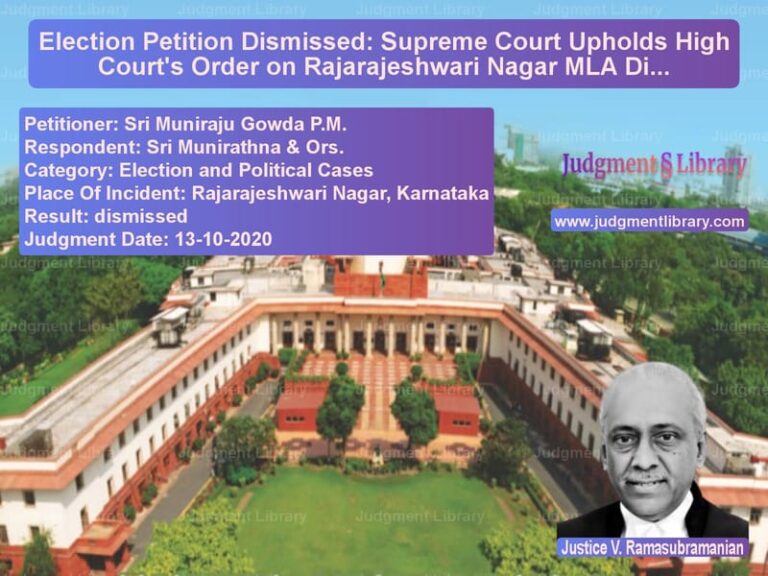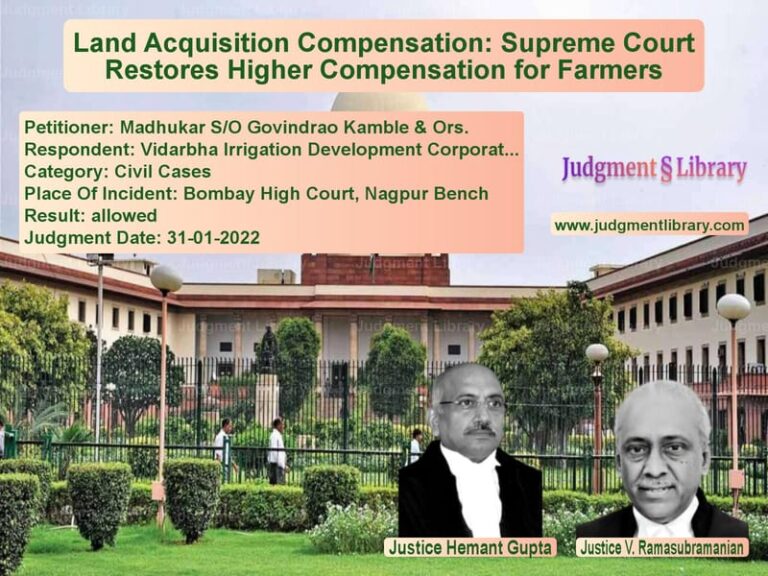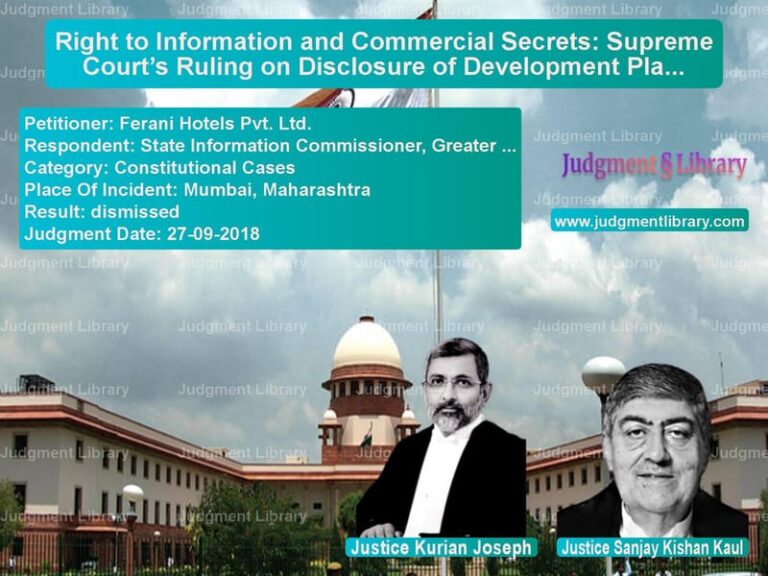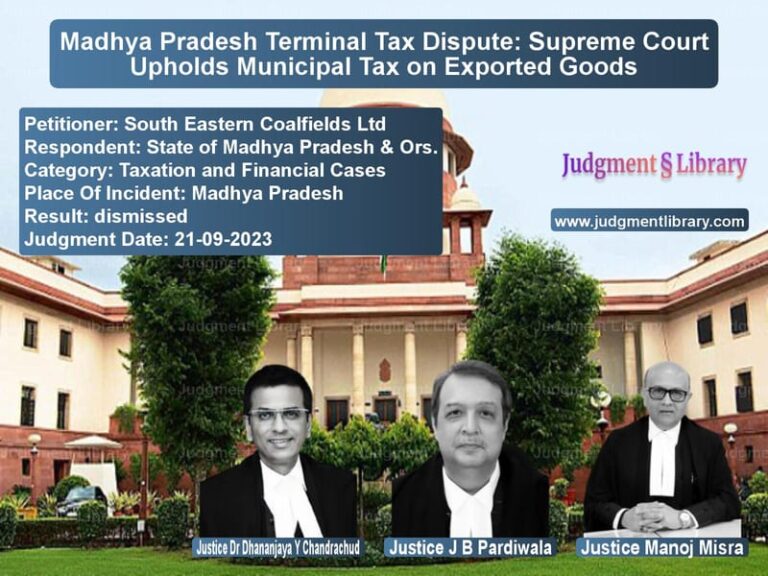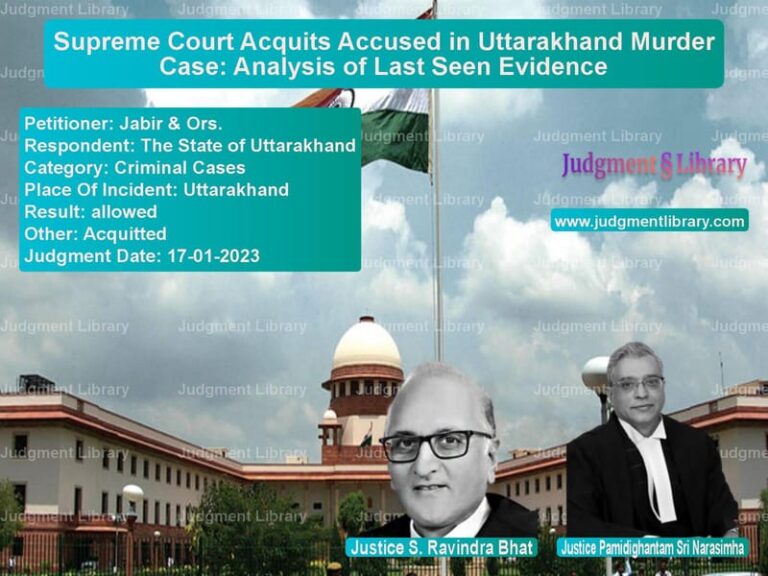Tenant Eviction Dispute: Supreme Court Revises Rent Terms and Grants Landlord Right to Fresh Eviction Petition
Introduction
The case of M. Thangavel v. R. Palani involved a landlord-tenant dispute regarding the eviction of the tenant under the Tamil Nadu Buildings (Lease & Rent Control) Act, 1960. The landlord had sought eviction on two grounds: arrears of rent and bona fide requirement for personal use. The case went through multiple judicial levels, where the courts primarily focused on rent arrears while upholding the eviction order. However, when the matter reached the Supreme Court, a more balanced approach was taken. While the eviction order was upheld, the Court permitted the tenant to continue occupancy under revised terms and granted the landlord liberty to file a fresh eviction petition on additional grounds.
This judgment highlights how courts can balance the legal rights of landlords and tenants by ensuring that evictions are not unjust but also that landlords are not deprived of their rights over their property.
Background of the Case
The dispute arose when the landlord, R. Palani, filed an eviction petition against his tenant, M. Thangavel, on two grounds:
- The tenant had accumulated arrears of rent, making eviction legally justified.
- The landlord required the premises for his bona fide personal use.
The Rent Controller ruled in favor of the landlord, granting the eviction on the ground of rent arrears. The Appellate Court and the High Court upheld this order, with the courts not examining the landlord’s claim of personal requirement. Dissatisfied, the tenant approached the Supreme Court.
While the appeal was pending before the Supreme Court, an interim order dated January 16, 2015, was passed, directing the tenant to pay Rs. 10,000 per month as use and occupation charges starting January 2015. This amount was consistently paid by the tenant.
Key Legal Issues Considered
The Supreme Court analyzed the following issues:
- Whether the eviction order based on rent arrears was justified.
- Whether the landlord’s claim of bona fide requirement was ignored in the lower court proceedings.
- Whether an alternative resolution could be reached to serve the interests of both parties.
Arguments of the Petitioner (Tenant)
The tenant, M. Thangavel, presented the following key arguments:
- He had been consistently paying the rent after the Supreme Court’s interim order, which demonstrated his willingness to continue the tenancy.
- The eviction order was unfair as it did not take into account his financial situation and the fact that he had cleared outstanding dues.
- The lower courts failed to consider the possibility of revising rent terms rather than enforcing eviction.
- The landlord’s bona fide requirement claim was not examined by the courts, making the eviction order incomplete in its consideration of facts.
Arguments of the Respondent (Landlord)
The landlord, R. Palani, countered the appeal with the following arguments:
- The tenant had defaulted on rent payments, giving him a clear legal right to seek eviction.
- The lower courts had ruled in his favor based on clear evidence of non-payment of rent.
- He required the premises for personal use and should not be deprived of his property rights due to prolonged litigation.
- The rent the tenant was paying was outdated and did not reflect the market value of the premises.
Supreme Court’s Observations
After hearing the arguments, the Supreme Court noted that the Rent Controller, the Appellate Authority, and the High Court had all ruled in favor of the landlord but had primarily focused on the issue of arrears of rent. The Court observed:
“It appears that the petition was considered only on the ground of arrears of rent since the landlord, according to the Rent Controller, the Appellate Authority, and the High Court, was entitled to succeed on that ground.”
However, the Court also recognized that neither the lower courts nor the High Court had examined the landlord’s claim of bona fide requirement. The Supreme Court, therefore, had to decide whether the eviction order should be enforced as it stood or if a revised approach was possible.
Upon discussion, both parties agreed that the tenancy could continue under revised terms while still allowing the landlord to file a fresh petition on all available grounds. The Court stated:
“The counsel for both sides on instructions have fairly submitted that the tenancy can be continued on revised terms in case the landlord is granted the liberty to file a fresh petition for eviction on all grounds available now.”
Final Judgment
Considering the submissions, the Supreme Court ruled as follows:
- The tenancy could continue under revised terms, and the monthly rent was fixed at Rs. 15,000 from March 2017.
- The tenant was required to pay the revised rent before the 10th of each month, either by cheque or through net banking.
- The landlord was given liberty to institute fresh eviction proceedings on any available grounds under the Tamil Nadu Buildings (Lease & Rent Control) Act, 1960.
The Court disposed of the appeal in these terms, allowing both parties to move forward with a clear legal framework.
Significance of the Judgment
This judgment is important for several reasons:
- It reinforces that rent arrears can be a valid ground for eviction but also that tenants can negotiate continued tenancy under revised terms.
- It clarifies that landlords are entitled to seek eviction based on bona fide requirements even if a previous eviction petition was decided solely on rent arrears.
- It highlights the importance of alternative dispute resolution, as both parties agreed to a revised tenancy instead of prolonging litigation.
Implications for Landlords and Tenants
The Supreme Court’s decision sets a precedent for resolving landlord-tenant disputes in a balanced manner. The ruling suggests that:
- Tenants should ensure timely rent payments to avoid legal disputes.
- Landlords must clearly present all eviction grounds in the initial proceedings to avoid partial adjudication.
- Courts can facilitate settlements where both parties can negotiate continued tenancy under new conditions.
Conclusion
The ruling in M. Thangavel v. R. Palani underscores the need for a fair and reasonable approach in rental disputes. While upholding the eviction order based on rent arrears, the Supreme Court provided a resolution that allowed the tenant to continue the tenancy under new terms while preserving the landlord’s right to seek eviction if necessary. The judgment sets an important precedent for handling similar disputes under Indian rent control laws.
Don’t miss out on the full details! Download the complete judgment in PDF format below and gain valuable insights instantly!
Download Judgment: M. Thangavel vs R. Palani Supreme Court of India Judgment Dated 14-02-2017.pdf
Direct Downlaod Judgment: Direct downlaod this Judgment
See all petitions in Landlord-Tenant Disputes
See all petitions in Property Disputes
See all petitions in Judgment by Kurian Joseph
See all petitions in Judgment by A M Khanwilkar
See all petitions in partially allowed
See all petitions in Modified
See all petitions in supreme court of India judgments February 2017
See all petitions in 2017 judgments
See all posts in Civil Cases Category
See all allowed petitions in Civil Cases Category
See all Dismissed petitions in Civil Cases Category
See all partially allowed petitions in Civil Cases Category


